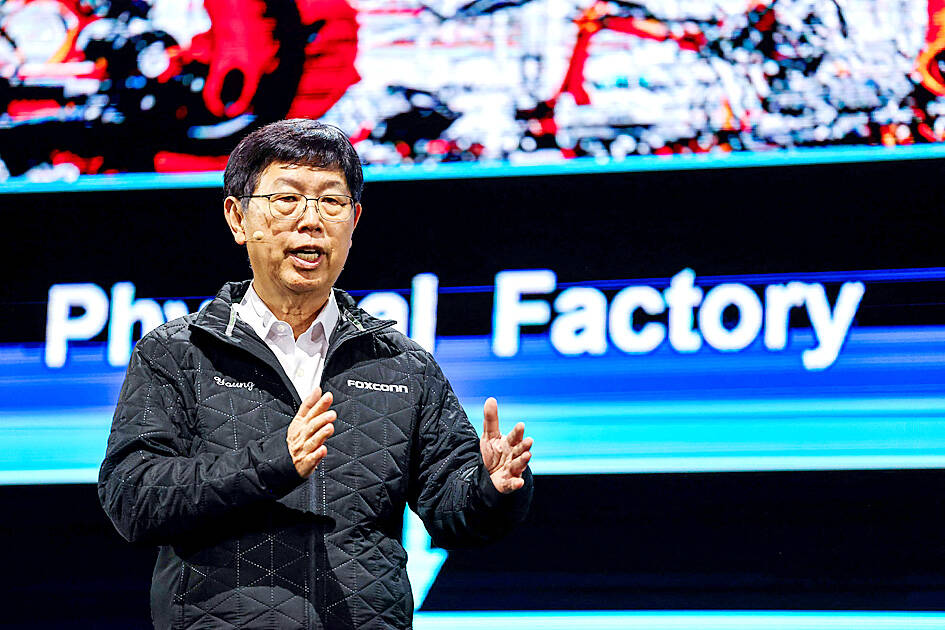Demand for computing power driven by smart manufacturing, electric vehicles and smart cities remains strong and is expected to keep increasing, Hon Hai Precision Industry Co (鴻海精密) chairman Young Liu (劉揚偉) said yesterday.
At a time when many people are reluctant to take low-paying jobs, combining artificial intelligence (AI) and robotics offers a viable solution for business transformation, Liu said.
In his keynote speech at the Computex trade show in Taipei, Liu said that Hon Hai, also known as Foxconn Technology Group (富士康科技集團), is developing a new generation of AI robots that go beyond simple hands and eyes.

Photo: I-hwa Cheng, AFP
By using Nvidia Corp’s Omniverse platform to equip the robots with brains trained through millions of simulations, they could be instantly effective in the real world and capable of transforming the manufacturing sector and supply chains, he said.
Factories would adopt extensive AI technologies to capture expert knowledge in areas such as defect resolution and equipment adjustments, with generative AI already handling 80 percent of the tasks, freeing humans to enable them to focus on high-value-work, he said.
These AI agents can learn, adapt and coordinate production, improving cycle time by more than 10 percent while generating tokens — the smallest unit of computation — laying the foundation for agentic AI and scaling expertise across factories, he said.
In addition to factory transformation, Hon Hai is developing smart electric vehicles (EVs) and smart city initiatives, with its electric buses — equipped with sensors to collect street data to be used in smart city applications — already operating in Kaohsiung, Liu said.
Hon Hai uses Nvidia technologies for smart cities, smart manufacturing and EVs, while it uses the Omniverse digital twin platform to build AI factories, he said.
The Omniverse enables developers to build AI-powered tools and services for industrial digitalization. With it, Hon Hai can simulate millions of training cycles, allowing robots to think and operate almost immediately upon deployment, Liu said.
Nvidia chief executive officer Jensen Huang (黃仁勳) later joined Liu as a special guest during the keynote speech.
The products that Nvidia developed with its Taiwanese supply chain partners are highly complex, with the GB200 servers — built in collaboration with Hon Hai — containing 1.2 million components, weighing nearly 2 tonnes and valued at US$2 million to US$3 million per stack, Huang said.

Real estate agent and property developer JSL Construction & Development Co (愛山林) led the average compensation rankings among companies listed on the Taiwan Stock Exchange (TWSE) last year, while contract chipmaker Taiwan Semiconductor Manufacturing Co (TSMC, 台積電) finished 14th. JSL Construction paid its employees total average compensation of NT$4.78 million (US$159,701), down 13.5 percent from a year earlier, but still ahead of the most profitable listed tech giants, including TSMC, TWSE data showed. Last year, the average compensation (which includes salary, overtime, bonuses and allowances) paid by TSMC rose 21.6 percent to reach about NT$3.33 million, lifting its ranking by 10 notches

Popular vape brands such as Geek Bar might get more expensive in the US — if you can find them at all. Shipments of vapes from China to the US ground to a near halt last month from a year ago, official data showed, hit by US President Donald Trump’s tariffs and a crackdown on unauthorized e-cigarettes in the world’s biggest market for smoking alternatives. That includes Geek Bar, a brand of flavored vapes that is not authorized to sell in the US, but which had been widely available due to porous import controls. One retailer, who asked not to be named, because

CHIP DUTIES: TSMC said it voiced its concerns to Washington about tariffs, telling the US commerce department that it wants ‘fair treatment’ to protect its competitiveness Taiwan Semiconductor Manufacturing Co (TSMC, 台積電) yesterday reiterated robust business prospects for this year as strong artificial intelligence (AI) chip demand from Nvidia Corp and other customers would absorb the impacts of US tariffs. “The impact of tariffs would be indirect, as the custom tax is the importers’ responsibility, not the exporters,” TSMC chairman and chief executive officer C.C. Wei (魏哲家) said at the chipmaker’s annual shareholders’ meeting in Hsinchu City. TSMC’s business could be affected if people become reluctant to buy electronics due to inflated prices, Wei said. In addition, the chipmaker has voiced its concern to the US Department of Commerce

STILL LOADED: Last year’s richest person, Quanta Computer Inc chairman Barry Lam, dropped to second place despite an 8 percent increase in his wealth to US$12.6 billion Staff writer, with CNA Daniel Tsai (蔡明忠) and Richard Tsai (蔡明興), the brothers who run Fubon Group (富邦集團), topped the Forbes list of Taiwan’s 50 richest people this year, released on Wednesday in New York. The magazine said that a stronger New Taiwan dollar pushed the combined wealth of Taiwan’s 50 richest people up 13 percent, from US$174 billion to US$197 billion, with 36 of the people on the list seeing their wealth increase. That came as Taiwan’s economy grew 4.6 percent last year, its fastest pace in three years, driven by the strong performance of the semiconductor industry, the magazine said. The Tsai